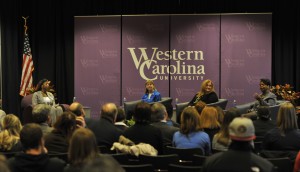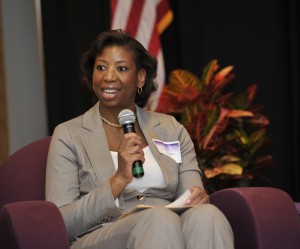
The NC Supreme Court justices speak to WCU community, March 28, 2015.
Photo by Mark Hasket, WCU Office of Public Relations.
The NC Supreme Court will be 200 years old in three years and Western Carolina University had the honor of hosting a forum with three of the seven women who have ever served on the state’s Supreme Court.
Justices Robin Hudson, Barbara Jackson and Cheri Beasley spent the Saturday March 28, touring the campus and talking with students, faculty, staff and administrators. The night ended with a panel where the justices talked about their experience and how they got there. They also explained how the Supreme court functions, how the cases get to be heard and how their regular day looks like. They also described the process of judicial elections, running a campaign, fundraising and public perceptions.
The audience of around 160 students, faculty, staff and community members had a chance to meet with the justices and chat further after the panel discussion.
As college undergraduates, all three of the justices studied in humanities and social sciences disciplines and want to discuss how their experiences brought them to where they are today.
“As a colleague likes to say, all our students first majors is Liberal Studies,” said John Whitmire, head of the department of philosophy and religion and one of the initiators of the event. And for all of the justices their undergraduate studies was important part of their growing and finding the path that lead them to today’s positions.
As Whitmire said this event tied several events happening on the campus: the inaugural Woman’s leadership conference held from March 27 through 28 complimented the university wide theme, North Carolina: Our state, our time, and a perfect end of the Woman’s history month.
The justices agreed that there are not many women on the Supreme Court or in the judicial system overall but they are much more then in the late 70s or 80s when justice Hudson started her career as a litigator.
The NC Supreme Court consists of a seven-member panel. This includes the chief justice and six associate justices. The justices are chosen by the state’s voters in nonpartisan elections or are directly appointed for the position. In 2011 NC Supreme Court had a majority of women justices that ended in 2014.

Asheville based attorney and WCU alumna, Jacqueline Grant was the moderator of the event.
Photo by Mark Hasket, WCU Office of Public Affairs.
“To have three women serving on the North Carolina Supreme Court is amazing for our state,” said lawyer and 1992 WCU graduate Jacqueline Grant who was moderating the event. Whitmire said that Grant is an important attribute to the forum because she adds the touch for WCU that she was once in the shoes of the students in the audience and now she is up on stage, accomplishing all that she is doing today.
So who are the justices? Since in the judicial system “seniority is everything” as Brandon Robinson, an attorney, two-time WCU alumnus and member of the WCU Board of Visitors, said when introducing the guest we’ll follow his lead.
Justice Robin E. Hudson started serving in the Supreme Court in 2007 and is the first woman who was not appointed to serve on the court before she was elected. In 2014, she was re-elected and will serve full term until 2022. She received a B.A. in philosophy and psychology from Yale University in 1973 and a J.D. from the University of North Carolina School of Law in 1976. Before joining the highest court in NC she was a judge at the Court of Appeals and spend 22 years as an attorney in private practice.
Justice Barbara Jackson served in the Court of Appeals from 2005 to 2010 when she was elected into the Supreme Court and started serving January of 2011. Her term ends in 2018. She received her B.A. from the University of North Carolina at Chapel Hill in 1984, and her J.D. from the same school in 1990.
Justice Cheri Beasley was appointed into the Supreme Court by Beverly Purdue and joined in December 2012. She ran for re-election in 2014 and won a full term until 2022. As the other two justices Beasley was a justice at the NC Court of Appeals elected in 2008. She is the first black woman to be elected to any statewide office in North Carolina without being first appointed by a governor. She received her B.A. in political science and economics from Rutgers University/Douglass College in 1988 and her J.D. from the University of Tennessee College of Law in 1991.
In the 90-minute-long forum, the justices answered questions from the moderator and few questions at the end from the audience.
One audience member asked them if they follow the Constitution (the federal and the NC) by the letter or as a living document. All of the speakers said that this political question is not something they consider when they are making an opinion on a case. They follow the law and sometimes judges interpret it differently but the law and the constitution is the guide in making a decision.
Justices Hudson and Beasley explained how cases come to the Supreme Court and how the decisions are made.
The last question that the justices answered was on their opinion on the education system.
The audience was happy with what they heard and some wanted to get more.
“The part I enjoyed the most was the justices sharing their struggles and their triumphs of their journey. It kind of helps motivate us on our journey,” Melisa Glatte, WCU student, said.
“Being a father of two young girls, it is important to have really significant role models on stage that can highlight what women can really overcome and accomplish,” said Whitmire.
Chancellor Belcher wanted to know about their mentors and people who helped them reach their goals especially because there were not many women in their field to follow.
“The most interesting part for me was the justices support of young women and people and the perpetuation of encouraging, mentoring, fostering and promoting positivity and reinforcement for women,” Regina Cline, criminology professor at WCU, said.
For the WCU alumni and Sylva native Bob Morris, this was an opportunity to get to know justices philosophies and opinion on capital punishment and he had a chance to chat with the justices at the end of the event.
This event was financially supported by the College of Arts and Science, Undergraduate studies, Intercultural Affairs and the Public Policy Institute.



